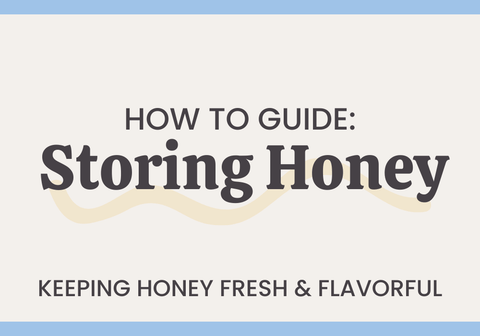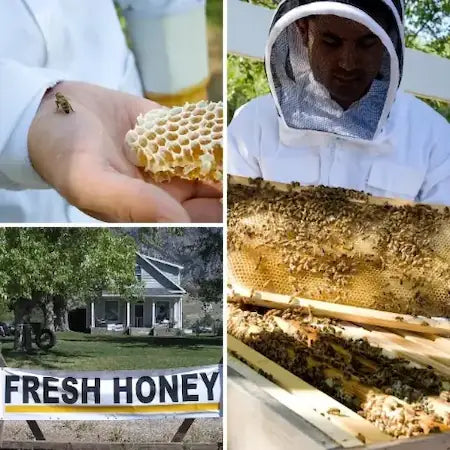Does Raw Honey Help Allergies? The Truth Behind the Buzz
Many people swear by raw honey as a natural remedy for allergies and a booster for the immune system, but does it really work? The idea that raw honey can help alleviate allergy symptoms is rooted in its natural properties and the theory of gradual exposure. Let's explore the science behind these claims and whether raw honey can truly provide allergy relief and immune support.
How Might Raw Honey Help with Allergies?
The concept that raw honey can help with allergies is based on a process similar to immunotherapy. Here's how it might work:
- Pollen Exposure: Raw honey contains small amounts of pollen from the environment. By consuming this honey, you may be exposing your body to tiny doses of pollen, which could help build tolerance over time.
- Gradual Desensitization: Just as allergy shots expose you to increasing amounts of allergens to build immunity, regular consumption of local raw honey may help your body become less sensitive to the pollen that triggers your allergies.
- Anti-Inflammatory Properties: Raw honey is known for its anti-inflammatory properties, which might help reduce the severity of allergic reactions and soothe symptoms like throat irritation.
Is It the Pollen in Honey That Helps with Allergies?
Yes, the pollen present in raw honey is believed to be the key component that may help with allergies. By ingesting small amounts of this pollen, your body might build up a tolerance to the allergens found in your environment. This gradual exposure can potentially reduce your sensitivity and alleviate allergy symptoms over time.
Does It Have to Be Local Honey?
Local honey is more likely to contain the specific pollen from plants in your area, which could be more effective for building tolerance to local allergens. However, even non-local raw honey may provide some general benefits due to its anti-inflammatory and soothing properties.
Can Raw Honey Boost My Immune System?
Raw honey is rich in antioxidants and has natural antibacterial and antiviral properties, which can help boost your immune system. Here's how it supports immunity:
- Antioxidants: Raw honey contains antioxidants, which help protect your cells from damage and support overall health.
- Antibacterial and Antiviral Properties: The natural enzymes and compounds in raw honey can help fight off infections and strengthen your immune response.
- Sore Throat Relief: Honey's soothing properties can alleviate throat irritation and coughs, common symptoms during colds and other respiratory infections.
Scientific Evidence and Studies
While the theory behind raw honey for allergies and immune support is intriguing, scientific evidence is mixed. Some studies suggest potential benefits, while others find little to no effect. Here are a few key points:
- Positive Findings: A 2011 study published in the Annals of Saudi Medicine found that honey consumption improved allergy symptoms in patients with birch pollen allergies. Participants who consumed birch pollen honey reported a significant reduction in symptoms compared to the control group.
- Conflicting Results: Other studies have not found a significant difference between honey consumption and a placebo in reducing allergy symptoms. This suggests that more research is needed to confirm the effectiveness of raw honey for allergy relief.
Practical Tips for Using Raw Honey for Allergies and Immunity
If you're interested in trying raw honey for allergy relief and immune support, consider the following tips:
- Choose Local Honey: Local raw honey is more likely to contain the specific pollen to which you are allergic, potentially increasing its effectiveness. If local raw honey is not available, consider using raw unfiltered honey until you are able to find a local source.
- Start Slowly: Begin with a small amount of honey and gradually increase your intake to help your body build tolerance.
- Consistency is Key: Consume raw honey regularly, ideally starting a few months before allergy season, to give your body time to adapt.
- Consult Your Doctor: Always consult with a healthcare professional before starting any new treatment, especially if you have severe allergies or other health conditions.
Final Thoughts
While the evidence on raw honey's effectiveness for allergies and immune support is still inconclusive, many people find relief and benefits by incorporating it into their diet. Whether it's due to the potential gradual desensitization to pollen or the soothing properties of honey, it may be worth a try for those seeking natural remedies.
Here’s a final tip when using honey for allergies: The most important thing to remember is that no matter how beneficial a particular honey might be, it won’t do you any good if you don’t actually use it. Many people have spent a lot of money on Manuka honey, attracted by its touted health benefits, only to be put off by its taste. It’s far better to choose a honey you enjoy and will use regularly than to let an expensive jar sit untouched on the shelf.
For more information on the benefits and uses of raw honey, check out our related posts on What is Raw Honey?, What Are the Health Benefits of Raw Unfiltered Honey?, and How Long Does Raw Honey Last?.

















